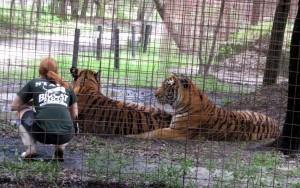The third remarkable person in this series is not usually considered a “person” at all. But I and my family have always considered his kind as people (see photo of Willow Hecht, below), and he has for 18 years been my friend and mentor in the art of living.
He is a cat: Fidel, whose full name is catus fidelis veritas. That’s our Latinesque taxonomy for his family, genus, and species: a true loyal cat. We usually just call him Catus, which we pronounce to rhyme with “caboose.”
This entry is not a reminiscence of a cute pet who is “smart” and acts just like a human. It’s a genuine part of my series “Meetings With Remarkable People”: a study of what makes one being a compelling, worthy exemplar of the great scope of an individual’s potentials.
Fidel is a non-human person and one of the most important persons in my life.
This is not an example of anthropomorphism (attributing human attributes to animals or other natural phenomena) but an emerging scientific, cultural and — we hope — political perspective. To put it in context: On September 17, 2013, though not widely publicized in the U.S., India issued a legal declaration that represents a momentous paradigm shift in our collective sense of self and our world.
India’s Ministry of Environment and Forests declared cetaceans — porpoises and whales — to be “non-human persons.”
The Declaration by no means grants them the same rights as bare-skinned chimpanzee-family people (we humans) — to vote, to marry, to sue, to receive public benefits, etc. — but it still represents a huge step toward recognition that at least some of our fellow creatures are people. We’re not alone. The Declaration reads, in part:
1. Every individual cetacean has the right to life.
2. No cetacean should be held in captivity or servitude; be subject to cruel treatment; or be removed from its natural environment.
3. All cetaceans have the right to freedom of movement and residence within their natural environment.
4. No cetacean is the property of any State, corporation, human group or individual.
5. Cetaceans have the right to the protection of their natural environment.
6. Cetaceans have the right not to be subject to the disruption of their cultures.
7. The rights, freedoms and norms set forth in this Declaration should be protected under international and domestic law.
I have swum among wild porpoises in the warm waters off the coast of Florida and Mexico, and — in a miraculous recapitulation of classical legend — was rescued by one during an inept and almost disastrous sailboat misadventure in the icy waters off the coast of Maine, in 1985. I would love nothing more than to develop a closer relationship with a cetacean, but I haven’t yet had the good fortune to know one personally.
However, I have known a catus fidelis veritas personally for 18 years, and he is also a non-human person, one who inspires me as an exemplar of balance and wholeness. That is, he demonstrates the harmonious integration of the diverse and often conflicting parts of personality. Unlike me, he is able to balance his wild nature with his civilized nature, independence with loyalty, strength with restraint, gravitas with absurdity, fierceness with forgiveness, pride with egalitarianism.
In following posts, I hope to convey some fraction of this person’s nature and what he has taught me about what it means to be “remarkable.”


